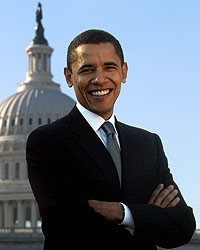Obama responds to criticism he cannot be US President
(AP)Updated: 2007-02-18 10:00 ORANGEBURG, South Carolina - White House hopeful Barack Obama, taking a fellow black lawmaker to task, said voters are ready to elect a black US president.
"At every turn in our history, there's been somebody who said we can't," the Democratic senator from Illinois told a nearly all-black audience of about 2,000 at Claflin University on Saturday.
 White House hopeful Barack Obama, taking a fellow black lawmaker to task, said voters are ready to elect a black US president.[senate.gov]  |
"Some people said we can't do this, we can't do that, so we shouldn't even try. If I have your support, if I have your energy and involvement and commitment and ideas, then I'm here to tell you, 'Yes we can."'
The comments drew the loudest ovation during a question-and-answer session in his first campaign swing through South Carolina, an early voting state in the Democratic primaries.
The first-in-the-South contest here is seen as a test of candidates' abilities to reach black voters. Half of the state's Democratic primary voters are black.
Obama responded to comments this past week by Democratic state Sen. Robert Ford of Charleston, South Carolina, who helped mobilize black voters for former North Carolina Sen. John Edwards in 2004, but has switched to Hillary Rodham Clinton in the 2008 presidential race.
Ford said Tuesday that Obama, a first-term senator, has much to prove. "The media made this guy bigger than life," Ford said. "This guy isn't tested and they made him a rock star."
Ford said one reason he was supporting Clinton, the New York senator, is that he is skeptical Obama can win the presidency and worries his nomination could hurt other Democratic candidates.
"Every Democrat running on that ticket next year would lose - because he's black and he's top of the ticket. We'd lose the House and the Senate and the governors and everything," Ford said.
Ford drew widespread criticism for his comment and later apologized.
US House Majority Whip Jim Clyburn, a South Carolina Democrat, introduced Obama, saying "Run, Barack, run."
"Obama is able to run today because Rosa Parks sat down," Clyburn said. "He is able to run today because Septima Clark stood up."
Parks, in 1955, refused to give up her bus seat to a white man in Montgomery, Alabama, sparking a mass boycott by thousands, mainly black women domestic workers who had long filled the buses' back seats.
Clark was an educator and activist for the National Association for the Advancement of Colored People decades before the nation's attention turned to racial equality.
Clyburn says he is not endorsing a primary candidate.
US Sen. Chris Dodd of Connecticut spoke earlier Saturday at a Richland County Democratic Party breakfast to a crowd of less than 100.
Both Dodd and Obama had to shorten their South Carolina visits to get back to Washington where they voted for a Senate resolution opposing sending more US troops to Iraq. The nonbinding measure fell four votes short.
Later Saturday, Gov. Timothy M. Kaine of Virginia endorsed Obama's candidacy.
"Just the opportunities we have had to work together, my sense of where the nation is and what the nation needs makes me believe that the senator is the right candidate," Kaine said at a news conference with Obama outside Virginia's Executive Mansion in Richmond.
Meanwhile, Edwards made a stop in Las Vegas on Saturday, taking his plan for universal health care to the local branch of the electrical workers labor group to which his brother belongs. He spoke to about 300 people at the local office of the International Brotherhood of Electrical Workers.
The Edwards campaign is hoping his ties to the labor movement will help him gain support in Nevada, which has taken on new importance in the Democratic nomination calendar since winning the No. 2 spot between Iowa and New Hampshire.
Edwards' health care plan, which he unveiled two weeks ago, requires employers to cover their workers or pay into a fund to help them. It also mandates that health care providers decrease administrative costs and switch to electronic records, and would create a market for individuals and small businesses to shop for coverage providers.
"It creates market power for people who don't have it, competition that doesn't presently exist," Edwards said.
|
||
|
||
|
|